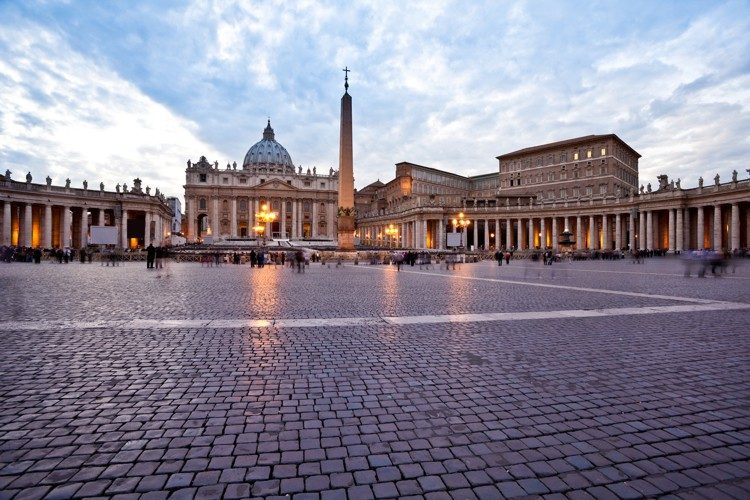
An interesting turn of events has occurred in a Vatican corruption investigation with the arrest of a Sardinian woman who is said to have been close to one of the Catholic Church’s most powerful cardinals before his fall from grace.
The financial police of Italy said Wednesday that they arrested Cecilia Marogna in Milan late Tuesday on an international warrant issued by the Vatican City State. An official of the Guardia di Finanza, speaking anonymously, said the agency could provide no further information because officers merely executed the warrant on behalf of a foreign country, the Vatican.
In recent weeks, Italian newspapers have reported that Cardinal Angelo Becciu, once the No. 2 in the Vatican secretariat of state, had sent hundreds of thousands of euros in Holy See funds to Marogna’s Slovenian-based consulting firm under the guise of humanitarian operations in Africa and Asia.
The reports, which include interviews with Marogna herself, have identified the 39-year-old as an intelligence expert and political analyst who reached out to Becciu in 2015 with concerns about security for Vatican embassies in hot spots, after which she rapidly entered the cardinal’s inner circle.
The Associated Press reports:
Marogna told Corriere della Sera that over four years, Becciu wired her 500,000 euros as compensation, travel reimbursements and consultancy fees. She defended some luxury expenditures — designer pocketbooks for example — as being “maybe for the wife of a Nigerian friend who was in a position to talk to the president of Burkina Faso.”
Becciu, who was sacked by Pope Francis last month after admitting he sent 100,000 euros in Vatican money to a charity headed by his brother, has insisted that his dealings with Marogna were legitimate.
In a statement issued by his lawyer on October 7, Becciu said “the contacts with Cecilia Marogna strictly pertains to institutional affairs.”
It is believed that Marogna’s arrest is part of a corruption investigation started last year by Vatican prosecutors into the Holy See’s 350-million-euro investment into a London real-estate venture, much of which was funded with donations from members of the Catholic Church.
Prosecutors are looking at various Italian middlemen accused of claiming tens of millions of euros in fees from the Vatican thanks to the incompetence of the Holy See’s money managers.
But Vatican prosecutors are yet to indict anyone, and the case looks challenging, in part due to potential conflicts, such as the fact that the Holy See’s superiors approved the contracts with the middlemen that ceded them voting rights in the deal and provided them with huge management fees.
It’s also not immediately clear what charges Marogna could face if she were merely on the receiving end of consulting fees approved by Becciu, who had been given far-reaching discretionary authority to manage the secretariat of state’s assets by the secretary himself, Cardinal Pietro Parolin.
Becciu served as a “substitute” in the secretariat of state from 2011-2018, the period during which the original real estate investment was made.
Neither Becciu nor his replacement have been formally identified as suspects in the case, though when Francis fired Becciu last month, he also revoked his rights and privileges as a cardinal, meaning he could eventually be judged by Vatican magistrates.
Both Becciu and Marogna have denied any wrongdoing and defended the original investment as sound.
This isn’t the only controversy the Vatican is currently involved in. For the first time, a clergy sex-abuse trial opened Wednesday in the Vatican’s criminal tribunal, with one priest accused of molesting an altar boy in the Vatican’s youth seminary and another priest accused of performing a coverup.
The scandal is notable because the abuse allegedly occurred within Vatican City itself. Moreover, the allegations were known since at least 2012 but were covered up by the Vatican and other church authorities until the victim and his roommate went public in 2017. This undermined Pope Francis’ pledge of “zero tolerance” for abuse. Eventually, the pontiff waived the statute of limitations in the case and signed off on a new policy for Vatican City requiring such crimes to be reported to Vatican prosecutors.
The seminary where the crimes allegedly took place, run by a Como, Italy-based association of priests, serves as a residence for boys aged 12 to 18, who serve as altar boys at papal Masses in St. Peter’s Basilica.
The youth seminary is run by the Como-based Opera Don Folchi. The group called allegations against the two defendants in the case “mud,” a “violent attack on the church” and nothing more than “calumny and falsifications.”




